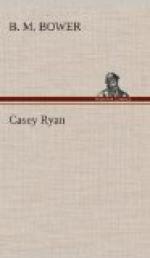Casey moralized a little. “Folks used to look at the goats that I’d maybe just hazed off into the brush fifty yards or so with a thousand pounds mebby of rocks, an’ some woman in goggles would say, ‘Oh, an’ you keep goats! How nice!’ like as if it were something peaceful an’ homelike to keep goats! Hunh! Lemme tell yuh; never drive past a place that looks peaceful, and jump at the idea it is peaceful. They may be a woman behind them vines poisinin’ ’er husband’s father. How could them darn tourists tell’what was goin’ on in Patmos? They seen the goats pertendin’ to graze, an’ keepin’ an eye peeled till my back was turned, an’ they thought it was nice to keep goats. Hunh!”
At last Casey could bear no more. He gathered together enough hardwood, three-inch crate slats to make twelve crates, and he worked for three nights, making them. And Casey is no carpenter. After that he worked for three days, with all the men in Patmos to help him, getting the goats into the crates and loaded on the truck. Then he drove over to the station and asked for tags, and addressed the crates to J. Paul Smith, Vista Grande Rancho, San Jose, Calif. Then he discovered that he could not send them except by express, and that he could not send them by express unless he prepaid the charges. And the charges on goats sent by express, was, as Casey put it, a holy fright.
But he had to do it. Patmos had been led to believe that he would send those goats off on the train, and Casey did not know what would happen if he failed. There were the heads of the six families, and all the children who were of walking age, grouped around the crates and Casey expectantly. Casey went back to the garage safe and got what money he had, borrowed the balance from the male citizens of Patmos and prepaid the express. Patmos helped to load them into the first express car going west, and Casey felt, he said, as if some one had handed him a million dollars in dimes.
Casey seemed to think that ended the story, but I am like the rest of you. I wanted to know what the Smith family did, and J. Paul Smith, and whether Casey kept the truck and sold it to the man who hauled water.
“Who? Me? Say! D’you ever know Casey Ryan to ever come out anywheres but at the little end uh the horn? Ain’t I the bag holder pro tem?” I don’t know what he meant by that. I think he was mistaken in the meaning of “pro tem.”
“You ask anybody. Say, I got a letter sayin’ in a gen’ral way that I’m a thief an’ a cutthroat an’ a profiteer an’ so on, an’ that I would have to pay fer the goat that was missin’—that there was the one I give away—an’ that the damages to the billy goat was worth twenty-five dollars and same would be deducted from the amount of the loan. Darn these fancy word slingers!” said Casey. “An’ the day before the note come due, here comes that shoestring in pants with the money to pay the note minus the damages, and four new tires fer the truck! Yessir, wouldn’t buy tires off me, even! Could yuh beat that fer gall? And he wouldn’t hardly speak.”




